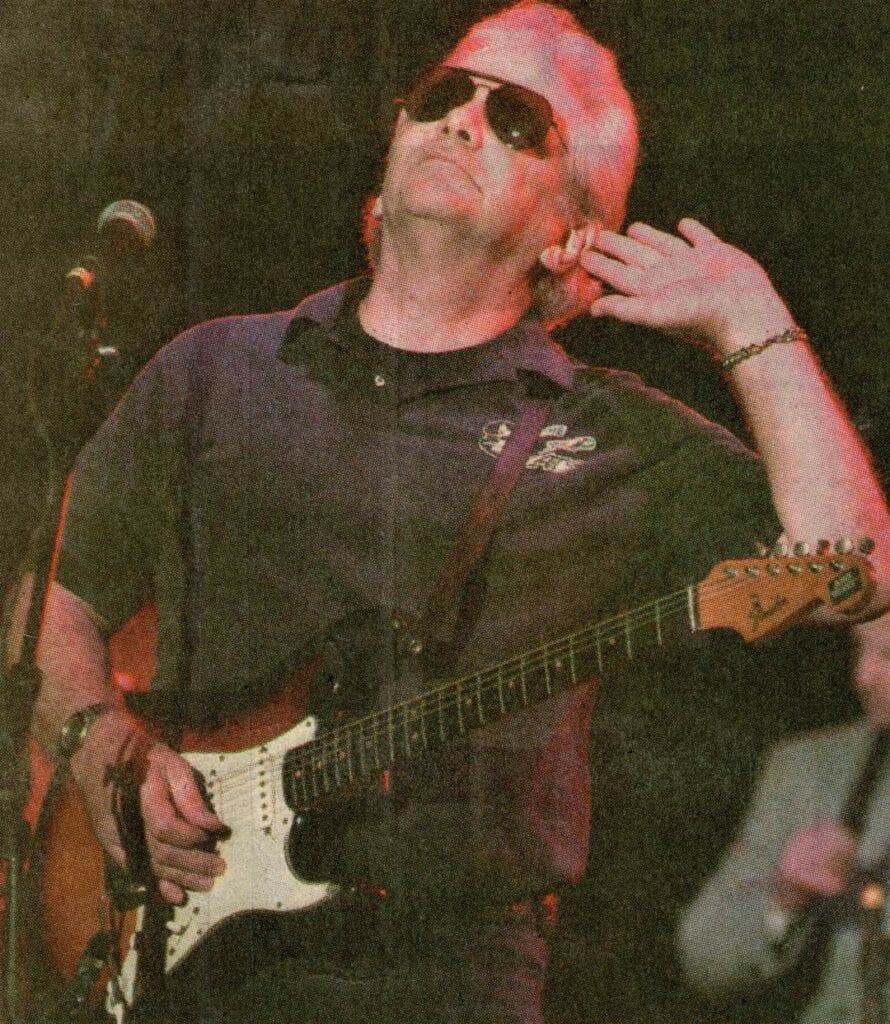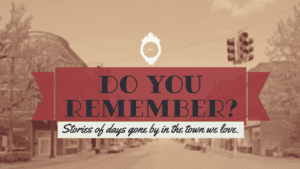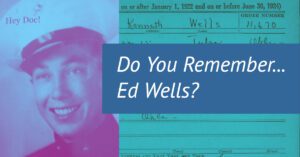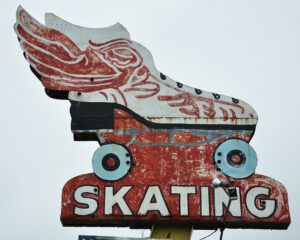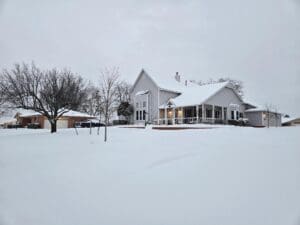For over 25 years, a Sapulpa native named John Henry was the voice of rock ‘n’ roll and blues in Tulsa. He billed himself as “Tulsa’s oldest teenager,” and he told his listeners, “Stay with rock ‘n’ roll, and you’ll stay young forever.”
John David Henry, born April 4, 1944 (4-4-44), grew up in Sapulpa and was the local personification of James Dean and Buddy Holly. In high school, he wore his hair in a pompadour, wore a black leather jacket, and owned a hot rod. John Henry was a member of a Sapulpa car club called the “High Lobes.”
At the same time, he had a talent for music and loved rock ‘n’ roll. While in high school he started a band, Johnny and the Crossfires. Classmate Lane Langley remembers the Spanish Club skit where the Crossfires provided the music.
According to Stan Johnson, young Henry’s hairstyle proved dangerous. Henry, who was in the chemistry lab at high school, was bending over a Bunsen burner used in an experiment. Unbeknown to John, the front of his hair caught fire. Without interrupting the instructions to the students, the teacher, Mr. Miles whacked Henry on the head with a clipboard, extinguishing the conflagration.
Terry Mikes recalls that John Henry was always friendly and was proficient at math, often helping her with her math homework. Several of Henry’s classmates said John was a bright young lad.
Jane Nabozny-Johnson recalls one day in junior high, John Henry was picking up his sister Jill from school, and she offered Jane a ride home. “I was awestruck! The famous—or should I say infamous—bad boy, Johnny Henry! My heart be still!”
After graduating from Sapulpa high school in 1962, John Henry attended Northeastern State College, The University of Tulsa, and Central State College, and attended Dallas Communications School.
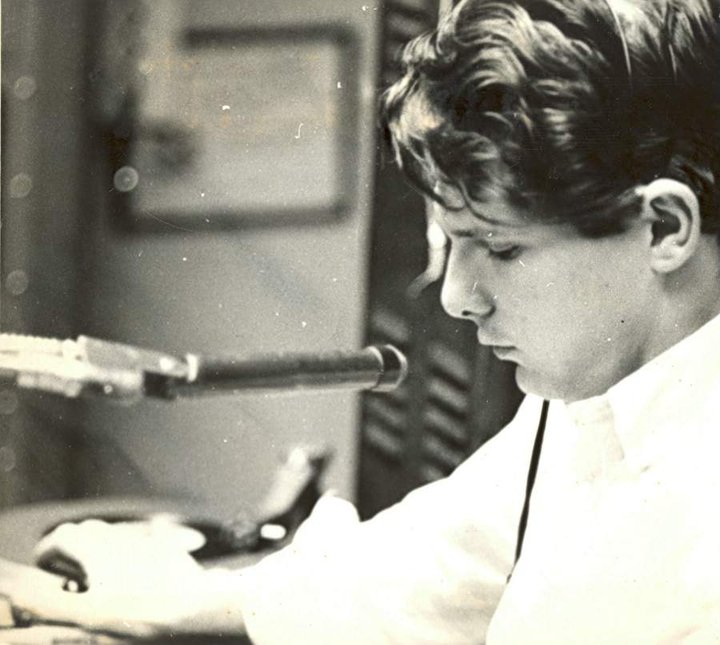
He was briefly a DJ at KREK in Sapulpa and then worked as DJ at KWPR in Claremore, Oklahoma.
For many years his day job was an executive position in the newspaper business. He was the national advertising representative for the Tulsa World/Tribune. John Henry’s son, James, said “radio was not his career, he did it for fun.”
John Henry, known as Rockin’ John to his listeners, began his “Saturday Bandstand” program in 1979 on former Top 40 AM station KELI. From its inception, the show featured early rock ‘n’ roll, blues, and R&B. Henry always included recordings from Tulsa-area artists, combined with a comprehensive commentary. Henry later added live and taped interviews with musical icons from the ‘50s and ‘60s.
John Henry was a voracious reader and possessed what one would term an eidetic memory. He was a “walking encyclopedia” of musical knowledge. According to lifelong friend Virgil Wildey, “he could tell you the history of the song, the artist, and how many were sold.” It was often said that if you asked, he could even tell you the color of the record label and perhaps the number of grooves a record had.
Shortly after starting the Saturday morning Bandstand, The oldies band, “The Bop Cats” was formed. In a newspaper interview, John Henry said, “Alan Lambert, a red-headed drummer named John Allen, and Ted Lane started the jam session stuff, and as time went by, people quit and new people joined. I’d met Bill Snow at a Ted Lane session, and he came in to play bass. And then my brother-in-law, David Riley, joined as a drummer. So it was actually Bill, David, and me that were the beginnings of the Bop Cats.”
The show moved from KELI to KGTO to KAKC, until finally, the oldies show was broadcast on KQLL (106.1 FM). In the mid-1980s, it started featuring regular “drop-in” appearances from celebrities like Tulsa actor Gailard Sartain, local music legends Bill Davis, Jimmy Markham, and David Teegarden.
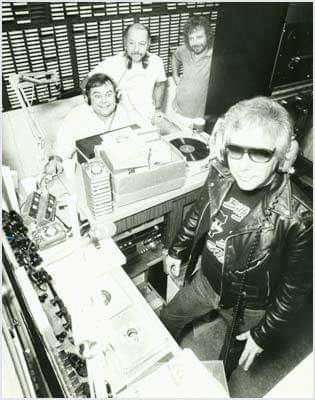
The Bop Cats either backed or opened many rock ‘n’ roll star performers such as Bo Diddley, Del Shannon, Fabian, Ricky Nelson, Little Anthony and the Imperials, Bobby Vee, The Coasters, The Drifters, The Marvelettes, The Diamonds, among the others.
Henry’s son James said that The Bop Cats played 80 or more gigs a year and were the highest-paid weekend band in the region. He also said that The Bop Cats opened their own club at 8th and Boston in Tulsa called “The Hop.”
Henry met, interviewed, and introduced a number of his musical idols, including Fabian, Del Shannon, and Chuck Berry. However to John Henry, they were more than music icons, they were friends.
When Chuck Berry came to town in 1991, using some members of the Bop Cats as his band, Henry made it clear that he wanted to play with the rock ‘n’ roll legend. Unfortunately, Berry’s contract said that no other guitar players could be on stage with him. Henry circumvented that stipulation by coming out on stage during Berry’s closing number and hit drummer David Riley’s cymbal with a drumstick.
In 1987, while Henry was doing “Saturday Bandstand” on KAKC, Station Manager/Regional Vice-President of Clearchannel Communications, Jim Smith, gave the okay to launch a blues show on KAKC’s sister station KMOD (97.5 FM). That program, “Smokehouse Blues With John Henry,” became a Sunday night mainstay on the station, often presenting live performances by musicians like Flash Terry, Glenn R. Townsend, and Bugs Henderson. The show was eventually syndicated, airing in cities such as Houston and New Orleans.
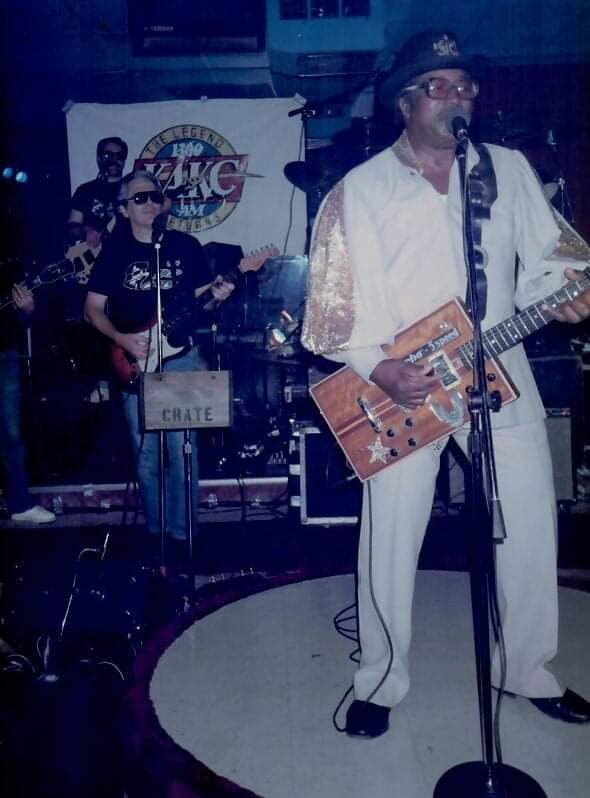
In 2001, Henry was inducted into the Oklahoma Jazz Hall of Fame “for his efforts in promoting and presenting blues music.”
Tragically, Henry died suddenly of a massive heart attack in 2004. Some say it was the day music died in Tulsa. However, thanks to nearly two years of painstaking work, James has digitized nearly 3,000 hours worth of his father’s shows. He is in the process of preserving Rockin’ John’s massive record collection that occupied an entire room. The “Rockin John Henry Archives” can be found on YouTube.

